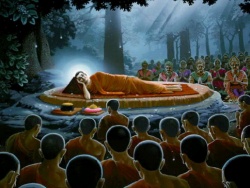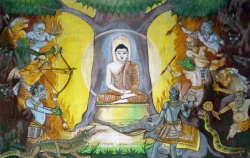What current day Buddhist Scholars say about Buddhapalita’s Mulamadhyamaka-vrtti
His Holiness the XIVth Dalai Lama In the Sydney 2009 teachings he stated that Buddhapalita’s commentary on Nagarjuna’s Fundamental Wisdom was the best commentary.
He notes how Jé Tsongkhapa is influenced by Buddhapaplita:
"Indeed when we read Buddhapalita, we can sometimes actually get the feeling that it is one of Jé Rinpoché's works that we have. This is a special feature, something that really distinguishes these works from others.¹"
Buddhapalita focuses on the essential meaning of dependent origination:
"It is clear that Nagarjuna's view of emptiness has to be understood in the context of dependent arising, not only from his own writings, but also those of later commentators such as Buddhapalita, who is very concise but clear²"
"Buddhapalita really sums up the Madhyamika position on how the understanding of emptiness reinforces one’s belief in the reality of the empirical world, the conventional everyday life. He sums up the points expressed in a wonderful passage in the Malamadhyamakakarika (Fundamental Verses of the Middle Way) by Nagarjuna. In it Nagarjuna states anything that is dependently originated has been taught to be emptiness and this is dependently designated. This is the path of the middle. Buddhapalita explains here that one’s true understanding of emptiness must take place in terms of dependent origination. One could almost say that there is a creation between dependent origination and emptiness. The fact of the dependence of things and events in itself suggests the emptiness of independent existence or inherent existence. The fact that things are devoid of inherent existence suggests that very dependent nature. Therefore in some sense they are two different sides of the same thing, two different ways of looking at the same thing. Therefore Buddhapalita has suggested a way of understanding Nagarjuna’s teachings on emptiness in a very unique way where emptiness and dependent origination are equated with each other.³"
Geshe Thupten Jinpa has been a principal English translator to the His Holiness Dalai Lama since 1985. He has translated and edited more than ten books by the Dalai Lama. After attaining his Geshe Lharampa degree he taught Buddhist epistemology, metaphysics, Middle Way philosophy and Buddhist psychology at Ganden for five years.
Jinpa also holds BA Honours degree in Western Philosophy and a PhD in Religious Studies, both from Cambridge Unversity UK. From 1996 to 1999, he was the Margaret Smith Research Fellow in Eastern Religion at Girton College Cambridge.
He has now established the Institute of Tibetan Classics where he is both president and editor-in-chief of the Institute's translation series Classics in Tibet. He is also a member of the advisory board of the Mind and Life Science, dedicated to fostering creative dialogue between the Buddhist tradition and Western science.
When asked about that we were considering to organise the translation on this work he replied in an email:
“So taking on this project is a very worthy project. In terms of importance, you could take a look at Ruegg's description of the work in his wonderful survey of Indian literature on Madhyamaka. Not only is this one of the earliest commentaries on MMK, it is also a very clear text. The influence of this work, especially on Candrakirti, and through Tsongkhapa to the Tibetan world, cannot be underestimated. This is also a text that is very dear to HH's heart. Traditionally too, according to the legend, it is at a crucial point of reading of chapter 18 of this text, that Tsongkhapa gained sudden insight into the ultimate nature of reality”.
Professor David Seyfort Ruegg Ruegg clarifies Buddhapalita’s central position in the history of Madhyamaka:
By the middle of the sixth century the Madhyamika followers of Nagarjuna had not only formed into a distinct school known as the Madhyamaka, but they were dividing into two branches with Buddhapalita (c. 470-540?) at the head of one and Bhavaviveka (Bhavya c. 500-570?) as the chief exponent of the other. (The Literature of the Madhyamaka School of Philosophy in India. 1981: 58) Candrakirti affirms Buddhapalita’s importance:
(Buddhapalita’s) great importance for the history of the Madhyamaka is amply vouched for by his follower Candrakirti. (1981: 60) For instance Candrakirti praises Buddhapalita’s adherence to Nagarjuna’s system:
How could it be, as is suggested (by Bhavaviveka), that the master Buddhapalita who followed the faultless doctrine of the master Nagarjuna, has propounded a statement that is open to objection (savakasavacana), so that an opponent would be in a position to impugn it? (Clear Words. Derge 3860, mdo 'grel, 'a: 8a) Ruegg explains:
(Candrakirti) criticized with acumen and penetration the objections against Buddhapalita’s procedure raised by Bhavaviveka and this Svatantrika master’s adoption of independent inferences and syllogisms. And he sought to establish once for all the prasanga method of reasoning, so that he has been regarded as the founder in the strict sense of the Prasangika school. (1981: 71)
Dr Peter Della Santina Peter Della Santina also notes the importance of Buddhapalita:
Buddhapalita was the first commentator to attempt the explication of the Madhyamaka refutation of the theory of the pre-existent effect as set forth by Nagarjuna. Hence his comments function as the point of departure for the subsequent interpretations offered by Madhyamaka scholars. (Madhyamaka Schools in India. 1986: 133) And:
(Buddhapalitas) interpretation may be regarded as the commencement of the Prasangika tradition of textual exegesis. (1986:134) Buddhapalita closely adhered to Nagarjuna’s system and clarified it:
While it may be said that the comments of Buddhapalita contain nothing which was not implicit in the statements of Nagarjuna, they nonetheless serve to clarify the criticism of the notion of self-origination suggested by the latter. (1986:133) Candrakirti has followed Buddhapalita’s lead:
Candrakirti follows the practice, established by Buddhapalita, of refuting the doctrine favoured by the opponent through arguments ad absurdum which elicit the undesirable consequences entailed by his position. (1986:134) Candrakirti extensively elaborated Buddhapalita’s exegetical style:
(Candrakirti) popularized the teaching of Buddhapalita through composing many important works (1986: 24)
Professor Richard Robinson Richard Robinson also notes Buddhapalita’s importance in the development of the Prasangika school:
Buddhapalita and Bhavaviveka reshaped (the Madhyamika tradition) and founded the Prasangika and Svatantrika schools. (Early Madhyamaka in India and China. 1978: 28)
¹Speech by His Holiness the 14th Dalai Lama to the Second Gelug Conference (Dharamsala, 6 December 2000) ²A Survey of the Paths of Tibetan Buddhism By His Holiness Tenzin Gyatso, 14th Dalai Lama of Tibet London, 1988 translated by Geshe Thupten Jinpa ³The Spirit of Manjushri By His Holiness the Dalai Lama at New York, New York May 1998


